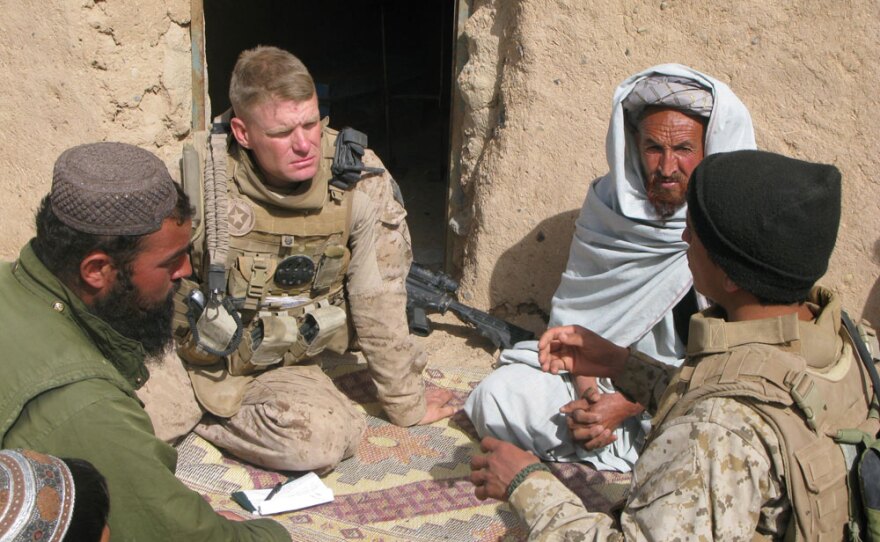U.S. and Afghan troops are now in the second phase of an operation to hold the ground they gained last month in the former Taliban stronghold of Marjah in southern Afghanistan. The operation involves building relationships with the locals, who have lived under Taliban control for the past two years.
U.S. Marine commanders who fought successfully to capture the poppy-growing region now have different objectives, such as starting up schools. But their efforts are hindered by a Taliban presence that is still felt deeply by the residents.
Lt. Col. Brian Christmas led the 3rd Battalion, 6th Marine Regiment in the fighting that drove many Taliban fighters out of Marjah.
Now he spends his days visiting dusty markets and holding meetings — or shuras — with local leaders. Christmas needs to convince them that the U.S. and NATO occupation is a benign presence that can help bring needed services, such as health and education.
The Need For A School
At one meeting, the sandy-haired, 39-year-old commander sat cross-legged on the ground amid a group of about 20 turbaned farmers and shopkeepers.
We know. You don't know. If you really want to help us, give us time.
One priority that the elders have identified is the need for a school, and Christmas, eager for a symbol of American goodwill, would like to make that happen.
"If you identify a building to hold school, and a schoolteacher, then as soon as that individual is ready to start teaching the children, I will provide school supplies, and I will pay the schoolteacher until the government picks it up," the commander told them.
Eventually a tall, black-bearded young man came forward. He is a motorcycle mechanic by trade, but he can read and write well, and his neighbors have suggested him as their first potential teacher.
Christmas left the meeting optimistic that he would soon see at least a rudimentary school in session.
Security Obstacles
But two days later, things got more complicated. Christmas arranged a meeting with the would-be teacher and visited him at his mud-brick shop. The American officer sat on a mat outside the shop with the mechanic and several other young men who might also teach at the school.

For more than an hour, the men raised various problems about where the school should be and how to provide security for it. Christmas, acting as part politician and part salesman, tried over and over to nail down the details.
"So, should we talk to the elders about renting a building, or would you like me to build an outdoor classroom?" he asked. But the comments kept drifting from the subject and a resolution was elusive.
Finally, the young mechanic brought up the real issue: If there is good security, he said, he can teach anywhere, but he's under pressure from the bad guys — the Taliban fighters who came from this area, and remain here, hiding among the population.
Christmas tried to point out that the security is here now, in the form of U.S. Marines, Afghan soldiers and national police. But the men were unconvinced.
Fears Of 'Night Letters'
The next day, Christmas was back for yet another meeting, still hoping to get some decisions on when and where the school would open.
The same young men came to the meeting, and they recited the same problems as the day before. But this time, the real cause for their hesitation was much more obvious.
One man said the Taliban will want to know why he has been talking with the Americans. They send "night letters" — notes that threaten death for anyone who deals with the foreigners.
Christmas had an answer for that: "If you know who they are, you point them out. Write them on a piece of paper and I'll go get them right now. You see what I'm saying? I know it's not that easy, but at some point you have to stand up."
But these men have experienced NATO-led security for only a couple of weeks. Before that, they lived for years under the control of Taliban fighters, many of whom were — and are — their neighbors.
One man, speaking halting English, insisted: "We know. You don't know. If you really want to help us, give us time. Give us one month."
A month is too long, Christmas told them, but if that is what the people want, they should come to him when they are ready. He walked away with his men, head down, pondering.
The Sheet Of Paper
Later that day, another man from the village approached the lieutenant colonel and asked to speak to him. This man, too, talked about how he is afraid of the Taliban and afraid of the night letters — a threat that's much more immediate for him than the presence of Marines or Afghan soldiers.
But after a few minutes, the man reached into his shirt and pulled out a folded sheet of paper.
"I know what that is," Christmas said. "I'll take that. I'll come see you later."
The commander wouldn't say whether the note contained the names of the Taliban operatives who are intimidating the villagers.
Copyright 2022 NPR. To see more, visit https://www.npr.org. 9(MDAzMjM2NDYzMDEyMzc1Njk5NjAxNzY3OQ001))






